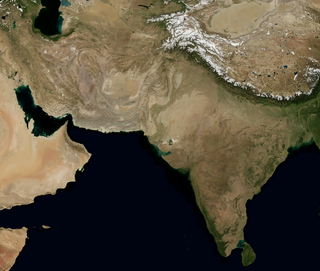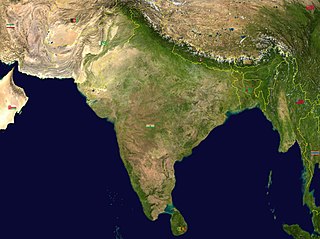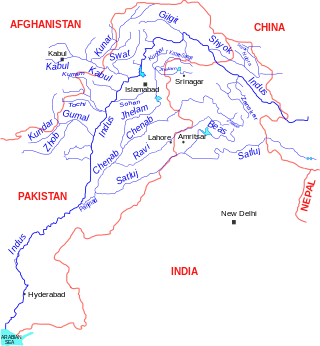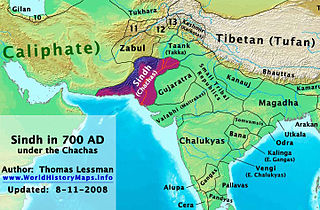Sindhu is the Sanskrit name for the Indus River, a major river in Tibet, India and Pakistan.
Contents
Sindhu may also refer to:
Sindhu is the Sanskrit name for the Indus River, a major river in Tibet, India and Pakistan.
Sindhu may also refer to:
Indian or Indians may refer to:

The Indus is a transboundary river of Asia and a trans-Himalayan river of South and Central Asia. The 3,180 km (1,980 mi) river rises in mountain springs northeast of Mount Kailash in Western Tibet, flows northwest through the disputed region of Kashmir, bends sharply to the left after the Nanga Parbat massif, and flows south-by-southwest through Pakistan, before emptying into the Arabian Sea near the port city of Karachi.

The Geography of Pakistan encompasses a wide variety of landscapes varying from plains to deserts, forests, and plateaus ranging from the coastal areas of the Indian Ocean in the south to the mountains of the Karakoram, Hindukush, Himalayas ranges in the north. Pakistan geologically overlaps both with the Indian and the Eurasian tectonic plates where its Sindh and Punjab provinces lie on the north-western corner of the Indian plate while Balochistan and most of Khyber Pakhtunkhwa lie within the Eurasian plate which mainly comprises the Iranian Plateau.
Sana or SANA may refer to:
Nara or Na-ra may refer to:
A Hindu is an adherent of Hinduism.

The Republic of India has two principal official short names, each of which is historically significant, India and Bharat. A third name, Hindustan, is also used commonly when Indians speak among themselves. The usage of "Bhārat", "Hindustān", or "India" depends on the context and language of conversation.

The Indus Water Treaty (IWT) is a water-distribution treaty between India and Pakistan, arranged and negotiated by the World Bank, to use the water available in the Indus River and its tributaries. It was signed in Karachi on 19 September 1960 by then Indian Prime Minister Jawaharlal Nehru and then Pakistani president Field Marshal Ayub Khan.
Punjabi, or Panjabi, most often refers to:

Sindhu kingdom or simply Sindhu was an ancient kingdom on the Indian subcontinent. It stretched the banks of river Sindhu (Indus). It was mentioned in the epic Mahabharata and in the Harivamsa Purana, often alongside the Sauvira kingdom. It is believed that Sindhu kingdom was founded by Vrishadarbha, one of sons of Sivi. According to the Glimpses of Ancient Sindh, authored by Mirchandani, its capital was known as Vrsadarbhpura, and Tulsianis, later known as Sindhu, was located at or near the location of the present town of Mithankot the inhabitants of the kingdoms were called Sindhus or Saindhavas. "Sindhu" literally means "river" and "sea". According to the epic Mahabharata, Jayadratha was the king of Sindhus, Sauviras and Sivis. Probably Sauvira and Sivi were two kingdoms close to the Sindhu kingdom and Jayadratha conquered them, holding them for some period of time. Sindhu and Sauvira seem to have been two warring states fighting each other.

The Nadistuti Sukta, is the 75th hymn (sukta) of 10th Mandala of the Rigveda. Nadistuti sukta is important for the reconstruction of the geography of the Vedic civilization. Sindhu is addressed as the mightiest of rivers and addressed specifically in verses 1, 2, 7, 8 and 9.

Hindush was an administrative division of the Achaemenid Empire. According to the Greek historian Herodotus, it was the "easternmost province" governed by the Achaemenid dynasty. Established through the Persian conquest of the Indus Valley in the 6th century BCE, it is believed to have continued as a province for approximately two centuries, ending when it fell to the Macedonian Empire during the Indian campaign of Alexander the Great.
Afzal may refer to:
The Indus River is a river that flows in India, Pakistan and Tibet.
Sindhu Darshan Festival is a festival held in Leh, Ladakh, India. The festival is held every year in June on the full moon day of Guru Purnima. On this day, devotees gather near the banks of the Indus River, which is known as the Sindhu River in India. Since 1997, the festival has stretched for three days, attracting large numbers of foreign and domestic tourists.
Sandhu or Sindhu is the second largest clan of Jats in the Punjab region of India and Pakistan. The Sandhus played an important role in the Sikh history. During the period of the Sikh Confederacy, Sandhus ruled several sovereign states (misls) including the Nakai Misl, Shaheedan Misl and the Kanhaiya Misl.
Sidhu may refer to:
Brar is a surname, and a Jat clan from the Punjab region.
Bhagwanti Navani was an Indian singer and actress known for her work in Sindhi-language music and films. She was a folk as well as playback singer. Due to her melodious and sweet voice, she was popularly known as "Sindhi Koel". Her marriage songs, called "Laada" are popular in India and Pakistan. She appeared as the heroine in the film Sindhua Jay Kinaray and performed as a playback singer in eight films.
Nayar or Nayyar is a surname that is found among Khatri community which are majorly Hindus with a minority of Sikhs and Muslims. The belong to the "Sareen" division among the Khatris. They were mostly concentrated in the Majha region especially in the districts of Gujrat, Lahore, Okara, Nankana Sahib and Sialkot before 1947. Nayyar families were known to have been qanungos (governors) in the town of Kunjah in Gujrat district, Punjab.